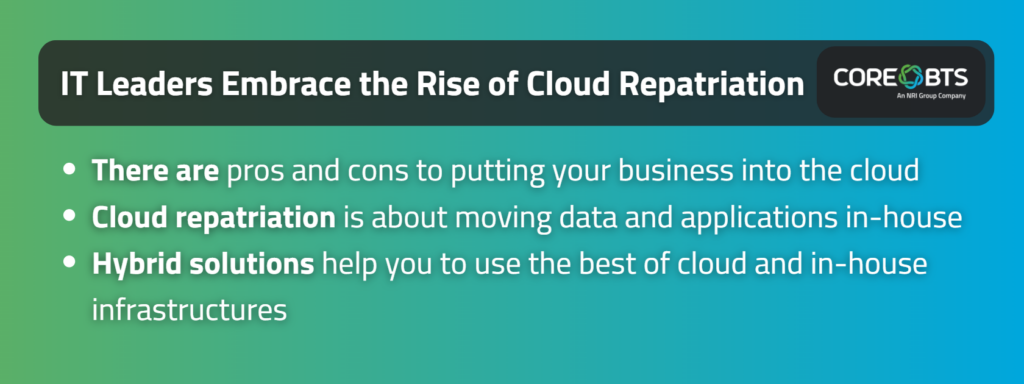An increasing number of IT leaders and C-suite executives are moving data and applications from the cloud to save money, improve data security, and optimize their operations.

While moving businesses to the cloud can have many benefits, a growing number of IT leaders and C-suite executives are exploring other options, fueling the rise of cloud repatriation. This is the process of moving apps, services, and data off public clouds back in-house into data centers, private clouds, or hybrid setups.
By moving data and applications from the cloud, businesses can realize cost savings, increase privacy and data security, optimize operations performance, offer strategic flexibility, and provide other benefits.
Consider the following information to help decide if cloud repatriation is right for your organization.
Manage Costs with Cloud Repatriation
One of the principal reasons businesses are moving some of their businesses out of the cloud into on-premise facilities and data centers is the rising associated costs. For example, the U.S. Bureau of Labor & Statistics’ Producer Price Index (PPI) for data processing, hosting, and related services (which includes cloud computing) rose 6.4% from September 2023 to May 2024.
Cloud providers often charge rising and fluctuating prices for services such as data transfer, computing, networking, licensing, management, and much more.
The Boston Consulting Group points out that the rise of generative AI (artificial intelligence) might cause rising costs: “Cloud workloads that perform AI training require a more sophisticated set of specifications than workloads constructed for more standard operations. These specifications can include significant memory requirements and often require more specialized computations, including optimized graphics processing units (GPUs).”
Many businesses may be wasting 30 to 50% of their cloud budgets, so they must seriously optimize their cloud operations. Part of the solution might be moving data from the cloud into more cost-effective storage and operations on-premises or in data centers.
Optimize Performance by Moving Data from the Cloud
On-premises solutions often perform better for certain applications with high data throughput and low latency requirements. Cisco points out: “Cloud repatriation allows companies to fine-tune their infrastructure to meet specific performance requirements, ensuring optimal user experiences and operational efficiency.”
The potential performance benefits of cloud repatriation may include:
- Greater control over infrastructure and data
- A greater range of customization options
- Possible lower long-term costs
- No reliance on the Internet for internal access
Enhance Security and Compliance
Moving data back on-premises can provide better control over data security and compliance, especially in regulated industries.
For example, compliance issues may arise with public cloud users, who must ensure their operations are configured to meet standards such as GDPR (General Data Protection Regulation), HIPAA (Health Insurance Portability and Accountability Act), and PCI DSS (Payment Card Industry Data Security Standard). Sometimes, the problem comes down to not knowing where data is physically stored and who has access to it.
A 2022 report reveals that several companies faced security problems because they had to use multiple proprietary tools for cloud security. This situation posed problems for businesses attempting to manage multiple clouds centrally, as well as trying to achieve greater visibility into operations and better policy enforcement.
Other Benefits of Cloud Repatriation
While cost, security, and performance are the major concerns driving cloud repatriation, moving data from the cloud can also have other benefits. These include:
Data Sovereignty
Many organizations are increasingly concerned about having greater control over sensitive data. Maintaining trust and control are paramount in industries such as healthcare and financial services, where vast amounts of sensitive information are involved.
Data sovereignty often involves ensuring that information resides in specific geographical locations to ensure greater control and compliance with local regulations. With cloud repatriation, data is stored in highly trusted environments, which provide greater safeguards and reduce the risks of data breaches and unauthorized access.
Customization and Control
An on-premises infrastructure allows for greater customization and control over IT environments. A company, for example, that is strictly concerned with data security and privacy can implement greater safety measures and define precisely who has access to vital information.
On-premise infrastructure can help companies gain far greater control over their hardware, software, and data management. They can set up customized configurations and security measures tailored to specific business needs. Such control may be essential for applications that require specialized hardware to run.
Risk Mitigation
Risk mitigation involves reducing reliance on third-party cloud providers who might cause issues with vendor lock-in and service outages. Vendor lock-ins involve being stuck with an inferior product or service because of financial concerns, the need to avoid disruptions to business operations, or a company’s lack of workforce and resources to bring in cloud operations on-premises.
If a business becomes reliant on a cloud provider’s software, migrating its data into a different environment might be difficult, requiring extensive data reformatting.
Lock-in can also leave a business prey to worsening conditions at a cloud provider, including more frequent service outages, suddenly rising costs, changes to the services provided, and more.
Data, services, and applications moved in-house remove the problem of relying on third-party vendors.
Strategic Flexibility
Balancing cloud and on-premises resources offers strategic flexibility to optimize IT operations based on evolving business needs. A hybrid setup merging a cloud infrastructure with an on-premises one can help structure your business for maximum scalability. It can respond nimbly to changing workload demands and volatile market conditions.
A private network acting as a dependable backup and a foundation for your enterprise’s growth can minimize the vulnerabilities of a highly adaptable cloud environment.
Is cloud repatriation right for your business?
Cloud repatriation is a strategic move driven by the need for cost control, performance optimization, enhanced security, and compliance. By understanding the drivers and benefits, you can decide what’s best for your business, balancing cloud and on-premises solutions.
At CoreBTS, we can help you decide what would best suit your needs, weighing the pros and cons of cloud-based and in-house technologies. We can also be a trusted partner as your company grows, providing strategies, for example, to help you surmount security challenges as you scale.
Contact us for a general assessment to better understand whether your business should focus on putting its head in the clouds or planting its feet on the ground.





Share on